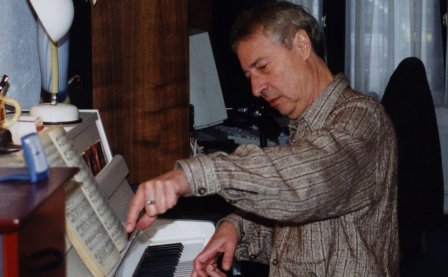Over the last several years, Jim O'Rourke has done little of what originally made his name synonymous with the word "ubiquitous." He hasn't released new material for eight years, and he's no longer producing albums at a furious rate. He's been relatively quiet with Wilco since 2004's A Ghost Is Born; he quit Sonic Youth in 2006; and Loose Fur hasn't released anything for over three years. In the past, O'Rourke was even known for his vocal cheerleading of lesser-knowns, either by using his reissue label, Dexter's Cigar (a subsidiary of Drag City), to introduce listeners to new artists or by simply lauding esoteric musicians like Luciano Cilio and Bill Fay. Now? We're lucky to hear anything about O'Rourke's tastes, let alone the music he's working on.
All of this, of course, has much to do with his move to Japan in 2006. Contrary to reports around that time, O'Rourke isn't there making films. He has instead been doing soundtrack work (with directors like Masao Adachi and Kōji Wakamatsu), writing film criticism, and improvising music with everyone from Akira Sakata and Otomo Yoshihide, to Masami Akita (Merzbow) and Keiji Haino. He's obviously still active, but the geographical distance and cultural barriers contribute in part to a different mythology, one based more on the ‘reclusive artist’ construction than on the omnipresence that informed O'Rourke's past biography, which was at one point so thorough that even his move from Chicago to New York raised flags.
Why, then, has it taken so long for him to release The Visitor, his first solo album since 2001's amazing (and largely misinterpreted) Insignificance?
It can all be attributed to finding the right context. In recent interviews, O'Rourke has lamented the fact that context is no longer an option because of the internet. "[It] doesn't matter what you do," he said to The New York Times, "somebody's going to change the context of it." He's not talking about the ethics of downloading; he's talking about the internet's supposed democratizing potential, where the appropriation of art forms is standard fare and where creativity has only become vaguer. This is why, according to The New York Times, The Visitor is unavailable as a download; the decision is an extension of O'Rourke's desire to create a context in which he has some control over the way the album is presented and experienced.
This insistence on having contextual control finds an odd parallel in The Visitor's music. Consisting of one continuous 38-minute track (a contextual statement of its own), the album is all instrumental, all performed by O'Rourke, and all recorded in his Tokyo home. It's designed as "part four" of his series of pop albums — continuing from Bad Timing, Eureka, and Insignificance — and, despite the wide gap in time, it sounds like it: The Visitor is clearly invested in the past. The title itself, derived subtly from director Nicolas Roeg's film The Man Who Fell to Earth (in contrast to the previous three solo albums, which take their names directly from Roeg film titles), implies a renewed engagement, something O'Rourke has called an intentional "folding back" as opposed to a linear trajectory.
While this context alone necessitates a different value set than one would bring to his more overtly experimental modes, what's most striking is how this contextual demand is often manifested in the music's perpetual stylistic shifts. One minute the album might be propelled by a lonely acoustic guitar articulating a gorgeous yet plaintive melody Bad Timing-style; the next 10 seconds it might be fully embellished with slide guitar, piano, banjo, horns, and percussion; and still later it may find itself treading into more abstracted areas, in which the instruments struggle to find tonality or rhythm altogether. The meter changes from duple to triple so often that listeners might have trouble traversing the sonic continuum, and any recurring themes (both melodic and rhythmic) are difficult to isolate on the first few listens.
And yet, "The Visitor" feels fully formed. Each movement smears effortlessly into the next, and the overall construction is deceptively intricate; O'Rourke has even said there are roughly 200 tracks of instruments (some of which he learned to play specifically for the album). Sure, it can feel abbreviated, punctuated, even disjointed at times, but the benefit of this constant flux is the invocation of its own context through presence rather than manipulation, which is similar in spirit (not style) to Eureka's "Prelude To 110 Or 220/Women Of The World" and to his downright avant-garde masterpiece Happy Days. And like his Rules of Reduction EP (a little jab at musique-concrète), he rarely allows us to indulge in any of its movements, short-circuiting them just as soon as they spread their legs. This execution commands attention not through sonic heft, but through the subversion of narrative and teleological thrusts. Immersion is not as much a goal as is the continual engagement with the listener, a constant reinforcement of a varied, but unified, context.
As usual, the confidence of O'Rourke's music is betrayed by his insecurities. In one interview, he said that The Visitor is "not going to be what people expect. Pretty much everyone is going to be disappointed." He's somewhat right too. Those looking for the chamber pop of the past will surely miss his misanthropic (and thoroughly hilarious) lyrics rubbing against his poignant exaggerations of the rock/pop formula. For that, they'll probably have to wait for his next orchestral pop album, which is reportedly seven years in the making. (It's written but needs to be recorded, if "possible" says O'Rourke.) But The Visitor seems especially appropriate in this age of additive excess. It's less a demonstration of O'Rourke's ego than of his conceptual vision, which has always been relayed with an innate sense of purpose -- a rarity these days.
1. The Visitor
More about: Jim O'Rourke




